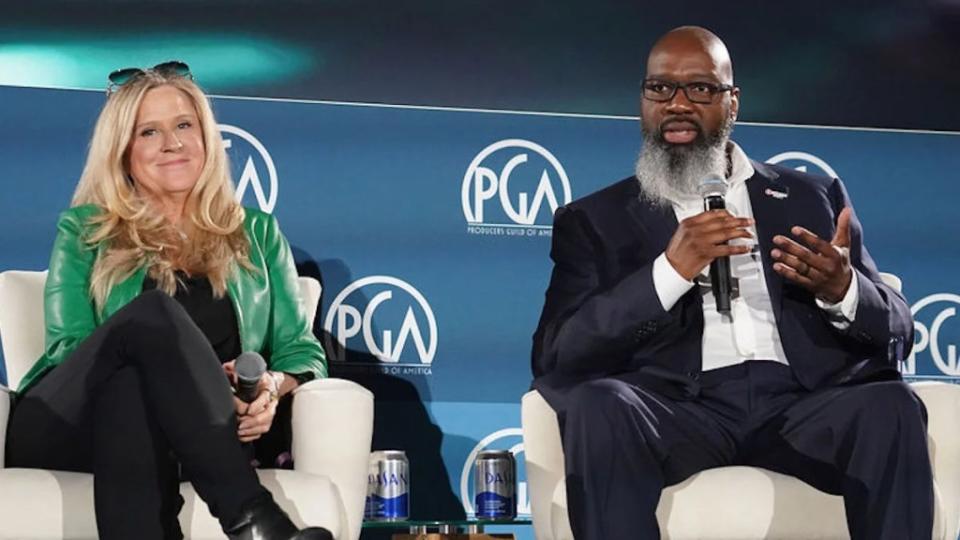AI Copyright Issues ‘on Shifting Sands’ but Legal Protections Are Coming, Experts Tell PGA Produced By Conference
AI experts took the stage at the PGA Produced By Conference on Saturday for a panel on the ways that generative and predictive AI has already changed the industry — plus the stumbling blocks producers may encounter as they embrace the technology, including copyright issues. Their predictions included to expect more legal protections for AI with a new government report coming this summer, harder-to-spot deepfakes and more.
Ghaith Mahmood, a partner at law firm Latham & Watkins, explained the intricacies of what can be copyrighted and what can’t — and how quickly that’s likely to change.
“To be copyrightable [content] must be authored by a human,” Mahmood said. “But I do think we’re on shifting sands,” ahead of the U.S. Copyright Office issuing a new report this summer.
Mahmood showed the sold-out crowd an elaborate AI-generated “space opera” drawing created by Jason M. Allen, using at least 624 prompts. Allen applied for a copyright in 2022 and was turned down, as the Copyright Office determined that it did not fit the “human authorship requirement.”
“The words you wrote for the prompts, that’s copyrightable, but the picture itself is not,” Mahmood explained of the current standard.

Deepfakes are getting harder to spot
Lori McCreary cofounded Revelations Entertainment with Morgan Freeman and said she’s always been able to spot deepfakes of the Oscar-winning actor and his inimitable voice — until recently.
“I’m pretty much the arbiter of what’s real and what’s not,” the CEO said of a video shared with her three weeks ago, “but I couldn’t tell you whether we shot it or didn’t shoot it.” She checked with Freeman and the makeup artist, both of whom said they had no idea it existed.
“That’s where we are now… I wouldn’t even have known it wasn’t Morgan if I wasn’t working with Morgan,” she continued. “And it’s really scary, because it’s this age of disinformation, the age of putting words in anyone’s mouth — it makes me frightened.”
Expect more legal AI protections
Mahmood pointed out that currently, there is no federal AI act as there is in Europe. However, he said to expect more laws like the Elvis Act, which just passed in Tennessee. That law makes it illegal to create a highly similar likeness to, specifically, Elvis Presley.
Blockchain technology might be used to track original content
Renard T. Jenkins — a former Warner Bros. Discovery exec who’s now president and CEO of I2A2 Technologies, Labs and Studios — said his company is working to help create an infrastructure to help with authenticating content.
“Back in the old days, you had watermarks,” he said, noting that file-based content can be altered to remove information about the original creator. “What we are attempting to do is create an infrastructure and ecosystem that would allow us to track every single iteration of a piece of content from its origins all the way through the distribution.”
For that to happen, the PGA and other organizations would have to agree to a new standard. “It’s a very heavy lift,” he said, comparing the necessary level of cooperation to a cross-mafia agreement, describing it as the “five families of Hollywood coming together.”
He also suggested that blockchain technology could be used to “audit and track” every change to a piece of content. It’s the same tech used for Bitcoin and the much-maligned NFT digital assets.
Humans still need to be in the mix
Jenkins said that when he asked ChatGPT to write a resume for him, it did a great job — except for the part where it credited him with a nonexistent Oscar win. “While I was happy to hear that,” he joked, “it was totally wrong.” He also shared anecdotes about AI citing books that don’t exist.
After discussing how AI translations into other languages don’t take into account localization, Jenkins added that people need to act as AI editors. “A human needs to be in the loop to make sure it’s right.”
Prompt engineers will be the “English major’s revenge”
“I like to say, because I’m married to an English major, that [prompt engineers will be the] English major’s’ revenge,” Jenkins said of the term for those with deeper experience and skill in crafting specific language to give to generative AI tools. “They are going to be the ones who really understand how to use this language.”
The post AI Copyright Issues ‘on Shifting Sands’ but Legal Protections Are Coming, Experts Tell PGA Produced By Conference appeared first on TheWrap.


